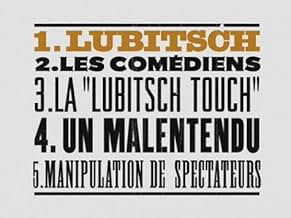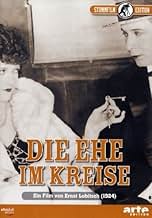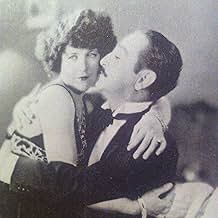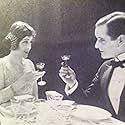IMDb-BEWERTUNG
7,0/10
1603
IHRE BEWERTUNG
Füge eine Handlung in deiner Sprache hinzuProfessor Stock and his wife Mizzi are always bickering. Mizzi tries to seduce Dr. Franz Braun, the new husband of her good friend Charlotte.Professor Stock and his wife Mizzi are always bickering. Mizzi tries to seduce Dr. Franz Braun, the new husband of her good friend Charlotte.Professor Stock and his wife Mizzi are always bickering. Mizzi tries to seduce Dr. Franz Braun, the new husband of her good friend Charlotte.
- Regie
- Drehbuch
- Hauptbesetzung
- Auszeichnungen
- 2 wins total
Empfohlene Bewertungen
Professor Stock (Adolph Menjou) and wife Mizzi (Marie Provost) have reached an impasse in their marriage and he wants out. Mizzi's best friend Charlotte ( Florence Vidor ) is blissfully married to Dr. Charles Braun (Monte Blue). His partner Dr. Mueller (Creighton Hale) has designs on Charlotte who has no interest. When Mizzi sets her sights on Dr. Braun suspicions, stoked by misinterpretation and the diabolical Mizzi arise and accusations fly.
The Marriage Circle is an excellent comedy of errors from the Silent Era featuring the wit and sophistication of Ernst Lubitsch that would go on to brilliantly inform some of the finest adult comedies before and after sound and code enforcement. Here he breezily unfolds his story with a benign amorality and suspense as his quintet of characters all share a little guilt and selfishness.
Vidor is a beauty and paragon of virtue to behold but capable of being petty. Blue and Hale comically pine and mope while Menjou is pure dinner at eight collected. Acting honors however belong to Provost's Mizzi whose side glances and brashness haul the rest of the characters into the circle.
The Marriage Circle is an outstanding example of silent film comedy and in large contrast to the slapstick that still dominated. Doors are closed, not slammed or run through, the humor is sly not pie in the face. Lubitsch conveys it beautifully here as he would into sound as well as influence a generation of filmmakers.
The Marriage Circle is an excellent comedy of errors from the Silent Era featuring the wit and sophistication of Ernst Lubitsch that would go on to brilliantly inform some of the finest adult comedies before and after sound and code enforcement. Here he breezily unfolds his story with a benign amorality and suspense as his quintet of characters all share a little guilt and selfishness.
Vidor is a beauty and paragon of virtue to behold but capable of being petty. Blue and Hale comically pine and mope while Menjou is pure dinner at eight collected. Acting honors however belong to Provost's Mizzi whose side glances and brashness haul the rest of the characters into the circle.
The Marriage Circle is an outstanding example of silent film comedy and in large contrast to the slapstick that still dominated. Doors are closed, not slammed or run through, the humor is sly not pie in the face. Lubitsch conveys it beautifully here as he would into sound as well as influence a generation of filmmakers.
This was Lubitsch's first film for Paramount following Rosita with Mary Pickford and sees him in transcendent form.
A highly sophisticated comedy set in Vienna (possibly to allow for the outrageous conduct of the characters)and rich in complex farce scenarios and intelligent narrative twists played by an excellent cast.
Marie Prevost is extraordinary as the relentless pursuer of the happily married Dr Franz Braum, happily married that is to her best friend played by Florence Vidor. Adolphe Menjou offers a characteristically fine performance as the betrayed husband seeking divorce from his wayward wife. His expressions are hysterical as he reveals his caustic feelings towards his spouse. This film explores issues of marriage, commitment, fidelity and temptation in the Lubitsch style. A very funny, touching comedy that displays Lubitsch's talent for understated sophisticated comedy. This stands alongside some of his best films such as The Shop Around the Corner and To Be or Not to be as an equal.
A highly sophisticated comedy set in Vienna (possibly to allow for the outrageous conduct of the characters)and rich in complex farce scenarios and intelligent narrative twists played by an excellent cast.
Marie Prevost is extraordinary as the relentless pursuer of the happily married Dr Franz Braum, happily married that is to her best friend played by Florence Vidor. Adolphe Menjou offers a characteristically fine performance as the betrayed husband seeking divorce from his wayward wife. His expressions are hysterical as he reveals his caustic feelings towards his spouse. This film explores issues of marriage, commitment, fidelity and temptation in the Lubitsch style. A very funny, touching comedy that displays Lubitsch's talent for understated sophisticated comedy. This stands alongside some of his best films such as The Shop Around the Corner and To Be or Not to be as an equal.
One near constant in the history of cinema is that romantic comedies tend to follow a very specific pattern. Chance encounters lead to romantic inclinations, and possibly drama in established relationships, but ultimately everyone is happy in the end - or at least most characters are, while anyone painted as a more antagonistic figure is probably left out in the cold. Even though we generally know the story before it's ever told, the finer points of the narrative can make all the difference. With slightly more somberly toned drama, this iteration is a little bit of a deviation from the genre norm, written with just enough deftness that for most of the length I wasn't actually sure exactly how it would end. Though hardly revelatory, 'The marriage circle' is fairly worthwhile.
All those small moments that cumulatively build into the divisions and connections between the characters are clever, and endearing as a viewer. Characterizations and intertitles aren't especially noteworthy, but the overall narrative is complete and cohesive, if unremarkable in retrospect nearly 100 years on. The scene writing is pleasantly engaging - a series of light scheming, misunderstandings, and near misses, with timing and cues just right to build the story with mild comedy. While their roles are pretty straightforward, the assembled cast put in solid performances to inhabit the parts and bring the tale to life. As the plot focuses most of all on the dynamics between Charlotte, Franz, and Mizzie, their respective actors get the most time in front of the camera, and Florence Vidor, Monte Blue, and Marie Prevost demonstrate suitable range, nuance, and physicality to communicate the mix of emotions sans sound or dialogue.
Whether one loves romantic comedies or hates them, there is nothing here to radically change one's mind about the genre. Meanwhile, enjoyable as this particular feature is, and for whatever tiny variations in the formula, there's nothing so outstanding about it that would make it a must-see. Yet it's ably written and directed, with capable performances from all involved, and is sufficiently appealing to keep us watching and entertained. Provided one is receptive to pictures from the silent era, and open to romcoms above all, 'The marriage circle' is an agreeable, satisfying diversion that's worth a look if you have the opportunity.
All those small moments that cumulatively build into the divisions and connections between the characters are clever, and endearing as a viewer. Characterizations and intertitles aren't especially noteworthy, but the overall narrative is complete and cohesive, if unremarkable in retrospect nearly 100 years on. The scene writing is pleasantly engaging - a series of light scheming, misunderstandings, and near misses, with timing and cues just right to build the story with mild comedy. While their roles are pretty straightforward, the assembled cast put in solid performances to inhabit the parts and bring the tale to life. As the plot focuses most of all on the dynamics between Charlotte, Franz, and Mizzie, their respective actors get the most time in front of the camera, and Florence Vidor, Monte Blue, and Marie Prevost demonstrate suitable range, nuance, and physicality to communicate the mix of emotions sans sound or dialogue.
Whether one loves romantic comedies or hates them, there is nothing here to radically change one's mind about the genre. Meanwhile, enjoyable as this particular feature is, and for whatever tiny variations in the formula, there's nothing so outstanding about it that would make it a must-see. Yet it's ably written and directed, with capable performances from all involved, and is sufficiently appealing to keep us watching and entertained. Provided one is receptive to pictures from the silent era, and open to romcoms above all, 'The marriage circle' is an agreeable, satisfying diversion that's worth a look if you have the opportunity.
Settling in Hollywood and freed from the whims of Mary Pickford, Ernst Lubitsch moved from the independent distributor United Artists to the minor studio Warner Brothers where he was allowed to make the first film in his career that really feels like a Lubitsch film. He'd touched on the ideas and tone here and there, mostly in his comedies The Doll and The Oyster Princess, but there was an embrace of silly physical comedy that seemed a bit out of step with his later work while engaging in more overt forms of farce. Not to imply that those didn't work, but they were just different. Now, with The Marriage Circle, Lubitsch was quickly settling into his domestic and romantic concerns between men and women that embrace wittiness rather than silliness.
Set in Vienna, the film is the story of two couples and a single man. The first couple are Professor Josef Stock (Adolphe Menjou) and his wife Mizzie (Marie Prevost), a pair who have been married for some time and have lost the spark of romance between them. Mizzie is best friends to Charlotte (Florence Vidor) who is newly married to Dr. Braun (Monte Blue), and the couple are deeply, earnestly in love. Dr. Braun has an associate, Dr. Mueller (Creighton Hale) who is smitten with Charlotte but also has the wherewithal to not actually act on it. Jealousy, intended adultery, and mistaken intentions end up driving the plot of the film as Mizzie decides that she's going to have an affair with Dr. Braun because he can obviously bring romance to her that her husband no longer offers. Meanwhile, Charlotte confides in Mizzie because she thinks that Dr. Braun is actually intent on an affair with the young Miss Hofer (Esther Ralston), and Professor Stock is so convinced of his wife's infidelity that he hires a private detective to follow her and gather evidence (that he guarantees he'll collect and lead to a divorce).
The joys in the film early are the lightly farcical elements, mostly around Charlotte thinking that Dr. Braun is infatuated with Miss Hofer, so she ends up pushing Mizzie towards Dr. Braun, thinking that it will blunt Dr. Braun's potential infidelities. The look on Mizzie's face as Charlotte literally pushes her into Dr. Braun's arms during a dance is really funny. And yet, there's always a satirical and sharp edged undertone to what's going on. Charlotte knows that something is wrong somewhere, and she trusts the one woman she shouldn't to help fix it. That helps the film veer really closely to something far more tragic than it turns out to be.
Dr. Braun ends up being a good man caught up in the wiles of an unscrupulous woman, and it seems like everything is going to go against him. Dr. Mueller thinks that he's cheating on his wife with Mizzie. Mizzie thinks he's just playing hard to get. Professor Stock ends up convinced, through his private investigator's work, that Dr. Braun is definitely having an affair with Mizzie. It's Dr. Braun's social standing that's at risk here, never his business or his life, but you can feel the edges of everything collapsing around him even though he has no way of making it better despite his best efforts. For a solid twenty minutes, I was convinced that this was going to be a tragedy.
And then things turn around. Just desserts are served. Social reputations are saved, and Dr. Braun ends up with the last laugh while two unlikely potential lovers end up leaving Vienna together. There's real delight in this ending because the character work had been so solidly built.
Now, I've complained pretty consistently that Lubitsch's characters have been thin through his silent period, in particular in his more tragic skewing historical films. I wonder if that's something to do with the writer of the film's scenario, Paul Bern, an Irving Thalberg devotee later in life. Lubitsch had regularly worked with Hanns Kraly and Norbert Falk while in Germany, but Bern seems to have understood how to build character in a silent film more naturally. The film's story is stripped of unnecessaries. It's not intimately tied to Vienna itself and could honestly have taken place in any major city of the time. The jobs of the individuals aren't that important and rarely get mentioned or really addressed directly. It's really about building up a cache of five characters and letting them operate within the rather plain looking surroundings, offering them a chance to bring themselves out of the realm of caricature and into actual character. Lubitsch allows his camera to let Mizzie be herself, her own awful self, and Stock to be himself, his own, detached self, in such a way that their relationship makes sense quickly, setting the groundwork very efficiently for Mizzie to understandably form designs on a more romantic man than her own husband.
The Marriage Circle is quite comfortably Lubitsch's most successful film up to this point. Whether it was the freedom from German company Ufa's house styles, his former writers, lessons he'd learned working for Mary Pickford, or the introduction of a new, talented writer in Paul Bern, Lubitsch was finding his voice more comfortably than ever. It may not end up being one of Lubitsch's great films, but it's the first film that is firmly Lubitsch while also being consistently entertaining and even a bit touching.
Set in Vienna, the film is the story of two couples and a single man. The first couple are Professor Josef Stock (Adolphe Menjou) and his wife Mizzie (Marie Prevost), a pair who have been married for some time and have lost the spark of romance between them. Mizzie is best friends to Charlotte (Florence Vidor) who is newly married to Dr. Braun (Monte Blue), and the couple are deeply, earnestly in love. Dr. Braun has an associate, Dr. Mueller (Creighton Hale) who is smitten with Charlotte but also has the wherewithal to not actually act on it. Jealousy, intended adultery, and mistaken intentions end up driving the plot of the film as Mizzie decides that she's going to have an affair with Dr. Braun because he can obviously bring romance to her that her husband no longer offers. Meanwhile, Charlotte confides in Mizzie because she thinks that Dr. Braun is actually intent on an affair with the young Miss Hofer (Esther Ralston), and Professor Stock is so convinced of his wife's infidelity that he hires a private detective to follow her and gather evidence (that he guarantees he'll collect and lead to a divorce).
The joys in the film early are the lightly farcical elements, mostly around Charlotte thinking that Dr. Braun is infatuated with Miss Hofer, so she ends up pushing Mizzie towards Dr. Braun, thinking that it will blunt Dr. Braun's potential infidelities. The look on Mizzie's face as Charlotte literally pushes her into Dr. Braun's arms during a dance is really funny. And yet, there's always a satirical and sharp edged undertone to what's going on. Charlotte knows that something is wrong somewhere, and she trusts the one woman she shouldn't to help fix it. That helps the film veer really closely to something far more tragic than it turns out to be.
Dr. Braun ends up being a good man caught up in the wiles of an unscrupulous woman, and it seems like everything is going to go against him. Dr. Mueller thinks that he's cheating on his wife with Mizzie. Mizzie thinks he's just playing hard to get. Professor Stock ends up convinced, through his private investigator's work, that Dr. Braun is definitely having an affair with Mizzie. It's Dr. Braun's social standing that's at risk here, never his business or his life, but you can feel the edges of everything collapsing around him even though he has no way of making it better despite his best efforts. For a solid twenty minutes, I was convinced that this was going to be a tragedy.
And then things turn around. Just desserts are served. Social reputations are saved, and Dr. Braun ends up with the last laugh while two unlikely potential lovers end up leaving Vienna together. There's real delight in this ending because the character work had been so solidly built.
Now, I've complained pretty consistently that Lubitsch's characters have been thin through his silent period, in particular in his more tragic skewing historical films. I wonder if that's something to do with the writer of the film's scenario, Paul Bern, an Irving Thalberg devotee later in life. Lubitsch had regularly worked with Hanns Kraly and Norbert Falk while in Germany, but Bern seems to have understood how to build character in a silent film more naturally. The film's story is stripped of unnecessaries. It's not intimately tied to Vienna itself and could honestly have taken place in any major city of the time. The jobs of the individuals aren't that important and rarely get mentioned or really addressed directly. It's really about building up a cache of five characters and letting them operate within the rather plain looking surroundings, offering them a chance to bring themselves out of the realm of caricature and into actual character. Lubitsch allows his camera to let Mizzie be herself, her own awful self, and Stock to be himself, his own, detached self, in such a way that their relationship makes sense quickly, setting the groundwork very efficiently for Mizzie to understandably form designs on a more romantic man than her own husband.
The Marriage Circle is quite comfortably Lubitsch's most successful film up to this point. Whether it was the freedom from German company Ufa's house styles, his former writers, lessons he'd learned working for Mary Pickford, or the introduction of a new, talented writer in Paul Bern, Lubitsch was finding his voice more comfortably than ever. It may not end up being one of Lubitsch's great films, but it's the first film that is firmly Lubitsch while also being consistently entertaining and even a bit touching.
A superb, honest, tender romantic comedy of manners, which features acting today's performers would be hard to match. You can laugh and feel for these characters. Ernst Lubitsch's smart direction keeps the movie always interesting, never dated.
"The Marriage Circle" should be required viewing for today's filmmakers. They'd learn how to reveal characters in emotionally complicated situations with minimum dialogue. And how to tell a story with minimum dialogue. And be funny.
"The Marriage Circle" should be required viewing for today's filmmakers. They'd learn how to reveal characters in emotionally complicated situations with minimum dialogue. And how to tell a story with minimum dialogue. And be funny.
Wusstest du schon
- WissenswertesMotion Picture Magazine (February-July 1924): 'In making the kissing scene in "The Marriage Circle," where the dutiful wife smacks another man other than her husband by mistake, Herr Lubitsch made Florence Vidor and Creighton Hale repeat the event exactly thirty-nine times before the kiss was right. Florence is a very lovely lady, but... well, thirty-nine times!'
- PatzerOn the letter that Dr. Braun writes asking Mizzi to choose another doctor, the printed address on Dr. Braun's stationery misspells Vienna as "Wein"; it is correctly printed as "Wien" as a return address on the envelope of the same letter.
Top-Auswahl
Melde dich zum Bewerten an und greife auf die Watchlist für personalisierte Empfehlungen zu.
- How long is The Marriage Circle?Powered by Alexa
Details
Box Office
- Budget
- 212.000 $ (geschätzt)
- Laufzeit
- 1 Std. 25 Min.(85 min)
- Sound-Mix
- Seitenverhältnis
- 1.33 : 1
Zu dieser Seite beitragen
Bearbeitung vorschlagen oder fehlenden Inhalt hinzufügen






























